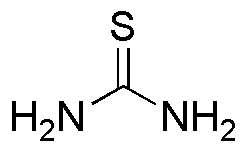Thiourea is widely utilized in research focused on:
- Agriculture: It serves as a nitrogen source in fertilizers, enhancing plant growth and crop yield by improving nutrient absorption.
- Pharmaceuticals: Thiourea is used in the synthesis of various drugs, particularly in the treatment of hyperthyroidism, due to its ability to inhibit thyroid hormone production.
- Industrial Applications: It acts as a reducing agent in the production of certain dyes and in the manufacturing of plastics, contributing to more efficient processes.
- Analytical Chemistry: Thiourea is employed in analytical methods for detecting heavy metals, providing a reliable way to ensure environmental safety and compliance.
- Biochemistry: It is used in protein denaturation studies, helping researchers understand protein structure and function, which is crucial for drug design and development.
General Information
Properties
Safety and Regulations
Applications
Thiourea is widely utilized in research focused on:
- Agriculture: It serves as a nitrogen source in fertilizers, enhancing plant growth and crop yield by improving nutrient absorption.
- Pharmaceuticals: Thiourea is used in the synthesis of various drugs, particularly in the treatment of hyperthyroidism, due to its ability to inhibit thyroid hormone production.
- Industrial Applications: It acts as a reducing agent in the production of certain dyes and in the manufacturing of plastics, contributing to more efficient processes.
- Analytical Chemistry: Thiourea is employed in analytical methods for detecting heavy metals, providing a reliable way to ensure environmental safety and compliance.
- Biochemistry: It is used in protein denaturation studies, helping researchers understand protein structure and function, which is crucial for drug design and development.
Documents
Safety Data Sheets (SDS)
The SDS provides comprehensive safety information on handling, storage, and disposal of the product.
Product Specification (PS)
The PS provides a comprehensive breakdown of the product’s properties, including chemical composition, physical state, purity, and storage requirements. It also details acceptable quality ranges and the product's intended applications.
Certificates of Analysis (COA)
Search for Certificates of Analysis (COA) by entering the products Lot Number. Lot and Batch Numbers can be found on a product’s label following the words ‘Lot’ or ‘Batch’.
*Catalog Number
*Lot Number
Certificates Of Origin (COO)
This COO confirms the country where the product was manufactured, and also details the materials and components used in it and whether it is derived from natural, synthetic, or other specific sources. This certificate may be required for customs, trade, and regulatory compliance.
*Catalog Number
*Lot Number
Safety Data Sheets (SDS)
The SDS provides comprehensive safety information on handling, storage, and disposal of the product.
DownloadProduct Specification (PS)
The PS provides a comprehensive breakdown of the product’s properties, including chemical composition, physical state, purity, and storage requirements. It also details acceptable quality ranges and the product's intended applications.
DownloadCertificates of Analysis (COA)
Search for Certificates of Analysis (COA) by entering the products Lot Number. Lot and Batch Numbers can be found on a product’s label following the words ‘Lot’ or ‘Batch’.
*Catalog Number
*Lot Number
Certificates Of Origin (COO)
This COO confirms the country where the product was manufactured, and also details the materials and components used in it and whether it is derived from natural, synthetic, or other specific sources. This certificate may be required for customs, trade, and regulatory compliance.


